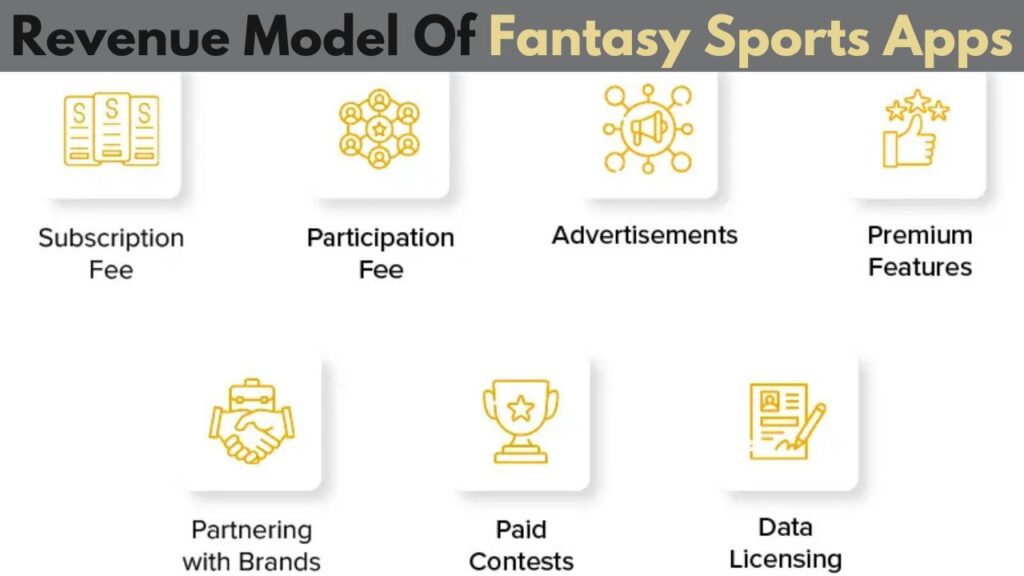Fantasy sports apps have taken the sports world by storm, offering enthusiasts a chance to not only showcase their sports knowledge but also win money in the process. From cricket to football, fantasy sports apps have become an integral part of the digital landscape. But have you ever wondered: how do fantasy sports apps make money?
In this article, we’ll break down the different revenue models of fantasy sports apps, their secondary streams of income, and why they continue to thrive in a competitive market. Whether you’re a fantasy sports player, a tech enthusiast, or a curious investor, this article will give you a comprehensive understanding of how these platforms generate income.
What is Fantasy Sports?
Before diving into the revenue model, let’s first understand what fantasy sports are. Fantasy sports are online games where players draft, manage, and compete with virtual teams made up of real-life athletes. These athletes score points based on their real-world performance, and the goal is for your fantasy team to outperform others.
Fantasy sports are popular in various sports like cricket, football (soccer), basketball, and baseball. The rise of online platforms has led to massive growth in the fantasy sports market, with millions of people now participating in fantasy leagues.
How Do Fantasy Sports Apps Make Money?

1. Entry Fees and Contest Prizes (Primary Revenue Model)
One of the most significant sources of income for fantasy sports apps comes from entry fees paid by users to participate in various fantasy sports contests. Players join these contests with a set entry fee and compete for cash prizes, which are typically awarded based on their team’s performance.
How It Works:
- Entry Fees: Fantasy sports apps usually offer multiple contests with varying entry fees, ranging from as low as $1 to several hundred dollars.
- Cash Prizes: The prize pool is usually a percentage of the total entry fees collected from all participants in the contest.
- Revenue: The fantasy sports app takes a commission, usually around 10-20%, from the total entry fees, keeping the rest as prize money for the winners.
This revenue model is straightforward: the more users that participate in contests, the more money the app earns. For example, apps like Dream11 and FanDuel have millions of active users, contributing to a massive cash flow.
2. Advertising Revenue (Secondary Revenue Model)
Another major source of income for fantasy sports apps is advertising revenue. With a large user base, these platforms can attract advertisers who want to promote their products or services to a highly engaged audience.
How It Works:
- In-App Advertising: Fantasy sports apps can display banner ads, interstitial ads, and video ads within the app or website.
- Sponsorships: Major sports brands, betting companies, and even local businesses may sponsor the app or specific contests.
- Affiliate Marketing: Apps might also partner with other sports-related platforms or businesses and promote them within the app, earning a commission for each user referred.
For example, FanDuel and DraftKings display advertisements for sportsbooks, apparel brands, and even digital wallets. Advertisers love these apps because they know that the users are engaged sports fans who are likely to convert into paying customers for their products or services.
3. Freemium Model: Premium Features
Fantasy sports apps often implement a freemium model, where the core features are free to use, but additional features or functionality come at a premium. This is a great way to generate extra revenue from existing users.
How It Works:
- Free vs. Paid Accounts: While the app is free to download and users can join contests, certain advanced features (e.g., enhanced stats, expert tips, or exclusive contests) are locked behind a paywall.
- Premium Subscriptions: Some apps offer premium subscriptions, such as VIP membership, which provides users with additional perks like higher rewards, faster payouts, or exclusive content.
Apps like ESPN Fantasy Sports and Yahoo Fantasy Football offer paid memberships or “premium leagues” where users can access deeper analytics, more detailed player data, and exclusive content for a fee.
4. Partnerships and Sponsorships
Fantasy sports apps often enter into partnerships and sponsorship deals with various sports leagues, teams, and even television networks. These partnerships provide the platform with credibility, exposure, and additional revenue streams.
How It Works:
- League Partnerships: Partnering with sports leagues (such as the IPL, NBA, or NFL) helps increase the app’s legitimacy and attracts more users. For example, an app might get exclusive rights to host fantasy contests for a specific league.
- Brand Sponsorships: Brands sponsor high-profile contests, paying the app a fee in exchange for exposure.
For instance, fantasy sports apps have partnered with IPL (Indian Premier League) and NFL for exclusive fantasy contests, which not only generate revenue but also drive user engagement.
5. Selling User Data (With Consent)
Some fantasy sports apps generate revenue by selling user data (with the users’ consent). The data can include user behavior, preferences, location, and more, which advertisers and marketers can use to target potential customers effectively.
How It Works:
- User Data Collection: Apps collect data on player preferences, team choices, contest entries, etc.
- Selling Data: This data is valuable to advertisers, marketers, and brands that want to target fantasy sports enthusiasts with tailored advertisements or promotions.
Though controversial, as long as the app complies with privacy laws and gets user consent, this can be an additional revenue stream.
6. Affiliate Marketing and Referrals
Fantasy sports apps can partner with other companies to generate revenue through affiliate marketing and referral programs. Many fantasy sports apps have referral programs where they incentivize existing users to bring in new users.
How It Works:
- Referral Links: When a user refers a friend to join the app using a special referral code or link, both the referrer and the new user get benefits such as bonus money or entry tickets for contests.
- Affiliate Deals: Some apps also promote external brands, such as betting apps, sports merchandise, or ticket services, and earn a commission when users sign up or purchase through these links.
This model incentivizes users to share the app with their network, increasing user acquisition while generating passive income for the app.
7. Transaction Fees and Withdrawals
Some fantasy sports platforms charge a small transaction fee on deposits or withdrawals. While this may not be a huge revenue stream, when combined with the large volume of transactions, it can add up.
How It Works:
- Deposit Fees: Users might be charged a fee when depositing money into their account to participate in fantasy sports contests.
- Withdrawal Fees: Some apps charge a small fee when users withdraw their winnings or funds from the app.
These fees often vary based on the amount being withdrawn and the payment method chosen (bank transfer, credit card, etc.).
Why Do Fantasy Sports Apps Work?
1. Growing Popularity of Fantasy Sports: As more people become interested in sports, fantasy sports apps continue to thrive. The global popularity of fantasy sports leagues, especially in cricket, football, and basketball, drives a continuous influx of new users.
2. Gamification: Fantasy sports apps use gamification techniques to keep users engaged. From leaderboards to daily or weekly challenges, these apps offer an immersive experience that encourages users to return for more contests and games.
3. Mobile-first Approach: Since most fantasy sports apps are designed for mobile use, they provide an easy and on-the-go way for users to participate in leagues and check scores. The app’s accessibility and convenience contribute to its widespread success.
Key Takeaways
- Entry fees and contest prizes are the primary revenue model for fantasy sports apps, with the app taking a commission on the total prize pool.
- Advertising is a major secondary revenue stream, with brands eager to reach an engaged, sports-loving audience.
- Freemium models and premium features offer a steady stream of income, especially for dedicated fantasy sports enthusiasts.
- Partnerships, sponsorships, and affiliate marketing are also crucial for monetizing these platforms, adding credibility and generating additional income.
- Selling user data (with consent) and transaction fees are additional ways fantasy sports apps make money, albeit more niche.
Understanding these revenue models gives us a glimpse into the ever-evolving business of fantasy sports. The combination of strategic partnerships, innovative marketing, and user engagement techniques ensures these apps remain highly profitable while giving users a chance to make some money of their own.
FAQs about How Do Fantasy Sports Apps Make Money?
Fantasy sports apps primarily make money through entry fees from users participating in fantasy contests. They charge a small commission (usually 10-20%) on the total entry fees for each contest. Additionally, they earn revenue from in-app advertisements, sponsorships, premium features, and affiliate marketing programs. Transaction fees for deposits and withdrawals can also contribute to their revenue.
Yes, many fantasy sports apps are free to download and use, but they still make money through various means. These apps typically generate income through entry fees from users who join paid contests, advertising revenue, and partnerships with brands and sports leagues. Some apps also offer premium features or exclusive contests for a fee, which contributes to their revenue.
Fantasy sports apps earn money from advertising by displaying ads within the app. These can include banner ads, video ads, or interstitial ads that appear as users interact with the app. Apps may also partner with brands for sponsored contests or promotions. Advertisers target the app’s highly engaged user base, making it an attractive platform for marketing.
Yes, users can make money by participating in paid fantasy sports contests. Players join contests by paying an entry fee, and if their fantasy team performs well, they can win cash prizes. The prize pool is typically made up of entry fees collected from all participants, and the platform takes a commission. However, players should be aware of the risks as there’s no guarantee of winning.
Some fantasy sports apps may sell or share anonymized user data with third-party advertisers or marketers to make money. This data typically includes user preferences, behavior patterns, and other non-sensitive information. However, it’s essential that apps comply with privacy laws and obtain user consent before selling data. Not all apps rely on this revenue model, and transparency is key to maintaining user trust.




